Supportive policies needed for EV charging infrastructure
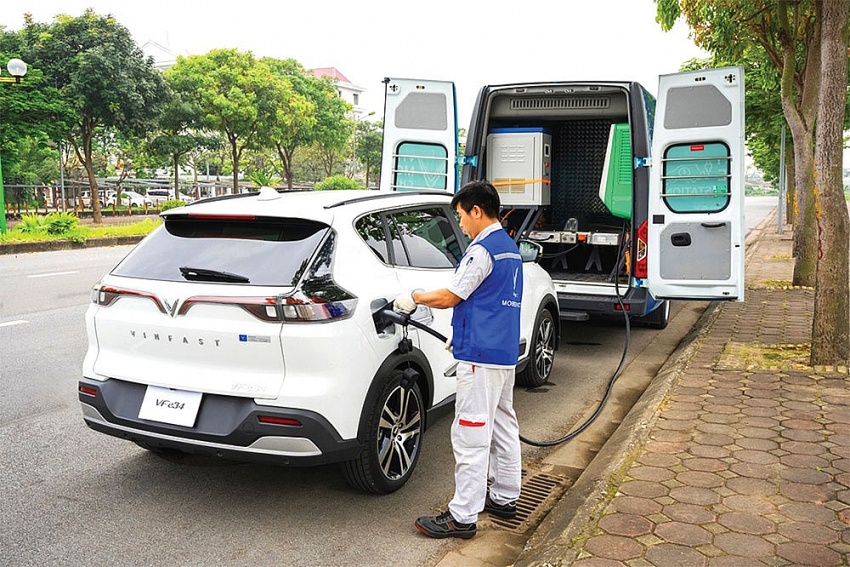 |
At last week’s National Policy Dialogue on accelerating the transition to electric vehicles (EVs) held by the Ministry of Transport, Deputy Minister Le Anh Tuan said that sales of EV batteries in the second quarter of 2023 rose eight-fold due to strong demand in Thailand, Vietnam, Indonesia, and Malaysia.
In Vietnam in recent years, more EV models are being made available in the market. In 2021, only 167 manufactured, assembled and imported EVs were certified, but the figures in 2022 hit about 22,000 as well as more than 11,000 hybrid cars. In addition, 2 million e-motorbikes and more than 700,000 electric bicycles have been sold.
“However, one of the difficulties hindering this wave is the weakness of charging station infrastructure. Businesses and users are very interested in equipment and services for EVs, especially charging stations for electric cars,” Tuan said.
Currently, there are about 50,000 EV charging stations across all provinces and cities in Vietnam.
“Although the number of charging stations increased significantly every year, we need more solutions to improve the quality of charging infrastructure,” Tuan added.
Ha Dang Son, director of the Centre for Energy and Green Growth Research, said that the current infrastructure system cannot meet future needs. If EVs develop too quickly while the supply capacity and electricity infrastructure cannot meet them, it will be a huge technical barrier.
“A full ecosystem and convenient infrastructure must be built for people to use EVs easily. However, in fact, the network of charging stations for routes among cities and provinces is too poor,” Son said.
“Moreover, monopolising charging stations will cause numerous difficulties in the development of electric transportation, so we need appropriate legal regulations to solve this trouble. In addition to EVs, there are some vehicles that use green energy, and we need to clearly define this and need more policies to promote the conversion to green energy vehicles,” he proposed.
Bui Hoa An, deputy director of Ho Chi Minh City Department of Transport, cited the results of a survey of more than 10,000 people in Ho Chi Minh City about whether they want to change to EVs or not. About 87 per cent of respondents said there was currently "no need."
“The four main reasons given are that charging station infrastructure is not widely covered, EV prices are expensive, battery technology is not strong enough, and they are used to traditional cars,” An said.
Wilmar Martinez from the United Nations Development Programme said in Germany, private-owned companies operate their own model, while state-owned companies comply with electricity prices. The South Korean government provides the biggest support to develop charging stations, while Thailand deploy a model like Tesla to provide free charging.
Martinez said, “The key points of these countries include deploying charging infrastructure, building standardisation, charging locations, charging sources and speeds, regulations on public charging and charging at private homes, fiscal and tax policies to develop this infrastructure.”
For Vietnam, Martinez highlighted five key points to expand the scale of charging stations: choosing a charging standard for itself, issuing preferential policies, prioritising charging infrastructure on roads with high traffic density, increasing taxes on petrol vehicles, and promoting investment in power grid infrastructure.
To achieve the goal that EVs can dominate the market by 2045, Dao Cong Quyet, representative of the Vietnam Automobile Manufacturers Association, recommended the cooperation and collaboration between the state and businesses.
“In particular, the state plays a role in guiding and developing policies and technical standards and regulations. After implementation, they should provide assessment on impact and influence to learn from experience and make adjustments,” Quyet said.
“On the business side, the research and investment of vehicle manufacturers need to be carried out in a balanced and harmonious way not to cause market disturbance, unless it can affect investment decisions on expanding business activities.”
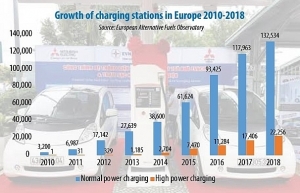 | Demand for charging stations causes jam in EV advancement As air pollution in big cities passes far beyond acceptable limits, the interest in electric vehicles is rising. However, the lack of an adequate charging infrastructure looks to be a major roadblock on the journey towards a clean vehicle transition. Ha Anh reports. |
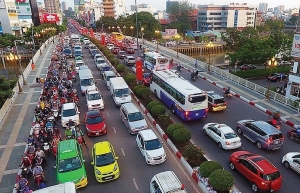 | Slow-charging progress in e-mobility in need of boost Rising air pollution amidst the rapid urbanisation in developing countries like Vietnam is a headache for authorities and citizens alike. Alongside Vietnam’s plan to ban motorcycles from big cities that remains in limbo, the country’s transition to e-mobility and building out the relevant infrastructure seems equally uncertain. Phuong Thu reports. |
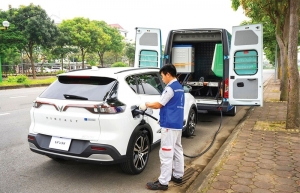 | Standardised charging a must for adoption of e-cars Vietnam is boosting the production of electric vehicles, with a rise in investment for related infrastructure. However, a lack of standards for charging systems may be holding back ambitions for this type of means of transport to dominate the market. |
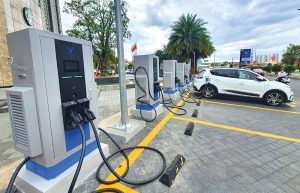 | EV charging stations enticing for investors As electric vehicles become more popular, developing charging stations and equipment is a promising area for investment. |
What the stars mean:
★ Poor ★ ★ Promising ★★★ Good ★★★★ Very good ★★★★★ Exceptional
Related Contents
Latest News
More News
- Kurz Vietnam expands Gia Lai factory (February 27, 2026 | 16:37)
- SK Innovation-led consortium wins $2.3 billion LNG project in Nghe An (February 25, 2026 | 07:56)
- THACO opens $70 million manufacturing complex in Danang (February 25, 2026 | 07:54)
- Phu Quoc International Airport expansion approved to meet rising demand (February 24, 2026 | 10:00)
- Bac Giang International Logistics Centre faces land clearance barrier (February 24, 2026 | 08:00)
- Bright prospects abound in European investment (February 19, 2026 | 20:27)
- Internal strengths attest to commitment to progress (February 19, 2026 | 20:13)
- Vietnam, New Zealand seek level-up in ties (February 19, 2026 | 18:06)
- Untapped potential in relations with Indonesia (February 19, 2026 | 17:56)
- German strengths match Vietnamese aspirations (February 19, 2026 | 17:40)

 Tag:
Tag:

























 Mobile Version
Mobile Version